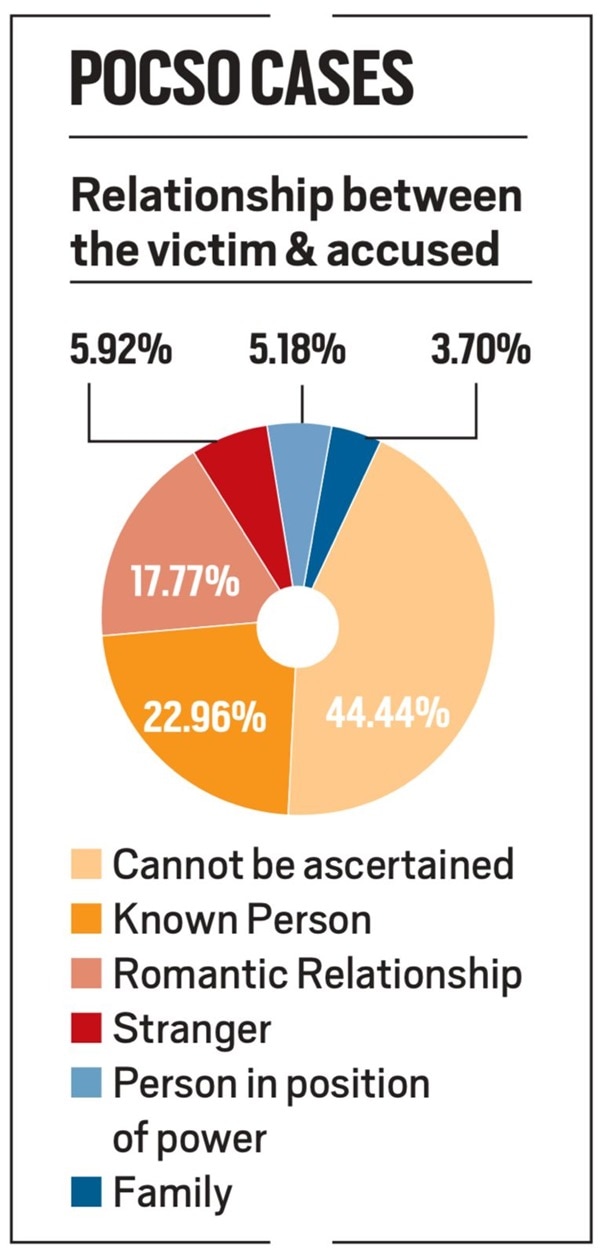14% conviction in POCSO; in a fourth of cases, accused known to victims, says study
The analysis, titled “A Decade of Pocso’’, was carried out by the Justice, Access and Lowering Delays in India (JALDI) Initiative at Vidhi Centre for Legal Policy, in collaboration with the Data Evidence for Justice Reform (DE JURE) program at the World Bank.
 Besides, in 22.9 per cent of the 138 judgments analysed in detail by the initiative, the accused were known to the victims — they were family members in 3.7 per cent of the cases. In these cases, 18 per cent involved a "prior romantic relationship" while the relationship between the victim and accused was not identified in 44 per cent.
Besides, in 22.9 per cent of the 138 judgments analysed in detail by the initiative, the accused were known to the victims — they were family members in 3.7 per cent of the cases. In these cases, 18 per cent involved a "prior romantic relationship" while the relationship between the victim and accused was not identified in 44 per cent.
Ten years after the enactment of the Protection of Children from Sexual Offences (POCSO) Act, an analysis by an independent think-tank of cases under this legislation in eCourts across the country has found that 43.44 per cent of trials end in acquittals and only 14.03 per cent lead to convictions.
Besides, in 22.9 per cent of the 138 judgments analysed in detail by the initiative, the accused were known to the victims — they were family members in 3.7 per cent of the cases. In these cases, 18 per cent involved a “prior romantic relationship” while the relationship between the victim and accused was not identified in 44 per cent.
The analysis, titled “A Decade of Pocso’’, was carried out by the Justice, Access and Lowering Delays in India (JALDI) Initiative at Vidhi Centre for Legal Policy, in collaboration with the Data Evidence for Justice Reform (DE JURE) program at the World Bank.
It studied 230,730 cases from eCourts in 486 districts spanning 28 states and Union Territories for the period 2012 to 2021.
Incidentally, according to data published by the National Crime Record Bureau (NCRB) in 2021, the accused was a person known to the victim in 96 per cent of cases filed under POCSO.
In the 138 judgments analysed by the Vidhi initiative, 5.47 per cent victims were under 10 years of age, 17.8 per cent between 10-15 years and 28 per cent between 15-18 years. The age of victims in 48 per cent of the cases were not identified.

Among the accused in these cases, 11.6 per cent were between 19-25 years of age, 10.9 per cent between 25-35 years, 6.1 per cent between 35-45 years and 6.8 per cent above 45 years — in 44 per cent of the cases, the age of the accused was not identified.
Overall, the analysis shows that over 56 per cent of all POCSO cases correspond to offences of penetrative sexual assault (31.18 per cent) and aggravated penetrative sexual assault (25.59 per cent).
Among the states, acquittals were seven times more than convictions in Andhra Pradesh, and five-fold in West Bengal. “Andhra Pradesh shows a huge disparity between acquittal and conviction figures with 56.15 per cent of the total disposed cases ending in acquittals and only 7.25% convictions. In West Bengal too, acquittals (53.38 per cent) are nearly five times the conviction figures (11.56 per cent). The situation is different in Kerala where the gap between acquittal and conviction is not very high with acquittals constituting 20.5 per cent of the total cases and convictions constituting 16.49 per cent,’’ the study said.
Delhi has the highest number of POCSO trials with the figure reaching 13.54 cases per 100,000 population in 2018. Five districts with the highest number of POCSO trials, pending and disposed, include Namchi in Sikkim, New Delhi, Central Delhi, Medak (Telangana) and West Garo Hills (Meghalaya).
UP has the highest pendency with more than three-fourths (77.77 per cent) of the total cases filed between November 2012 and February 2021. At 80.2 per cent, Tamil Nadu has the highest disposal, but many of these cases were disposed of because of transfers.
The study also found a sharp increase of 24,863 cases in the number of pending cases between 2019 and 2020 due to the Covid pandemic. Five districts with the highest pendency percentages include Lucknow, Hardoi, Badaun, Allahabad (UP) and Howrah (West Bengal).
The study found that on an average, it takes 509.78 days for a case to be disposed of, whereas the POCSO Act stipulates that cases should be disposed of within a year.
At 1284.33 days in 2020, Delhi had the highest average case length — the number of days an average case remained pending. “One of the primary reasons for this high pendency is the slow pace of investigation by the police and the delay in depositing samples with the Forensic Science Laboratories… investigation completed in less than 60 days only in 35 per cent of POCSO cases. For 36 per cent of the cases, it takes more than six months just to complete the investigation,’’ the study said.
A total of 22.76 per cent cases were “disposed” of by virtue of transfers from one court to another — “one-fifth of the cases in this dataset ended in transfers’’, said the study. Since POCSO cases are supposed to be tried by special courts, the transfers indicate “either administrative mismanagement or wrongful appreciation of facts by the police’’, the study said.
While the percentage of transfers out of total disposals was only around 8 per cent in 2013, it rose to a little over 19 per cent in 2019 and 42 per cent in 2020. “This is concerning because precious time is being wasted if the matter has to be transferred from one court to another and unnecessary delay is being caused in the trial process,’’ the study said.
According to the analysis, the average case length has increased from year to year in many states — Assam, Chhattisgarh, Gujarat, Karnataka, Tamil Nadu, West Bengal and Himachal Pradesh — indicating that most cases being disposed of are those pending for multiple years.
Of the 22,625 cases disposed of in 2018, 45.63 per cent were done in less than one year, 29.67 per cent in one-two years, 13.54 per cent in two-three years and 11.16 per cent in more than three years.
The proportion of cases disposed of in less than one year has gradually decreased – from over 60 per cent in 2016 to 42.07 per cent in 2018.
The study has flagged that “support persons” are not being appointed in most cases, special courts have not been designated in all districts, and there is a lack of Special Public Prosecutors appointed specifically for POCSO cases.
For instance, it said, as of 2022, 408 POCSO courts have been set up in 28 states as part of the Government’s Fast Track Special Court’s Scheme.
Besides, the analysis shows, states like Chhattisgarh, Haryana, Kerala, Sikkim, Chandigarh and the NCT of Delhi seem to have a much higher reporting of cases when compared to the other states. Delhi has the highest reporting of POCSO cases in the country.







